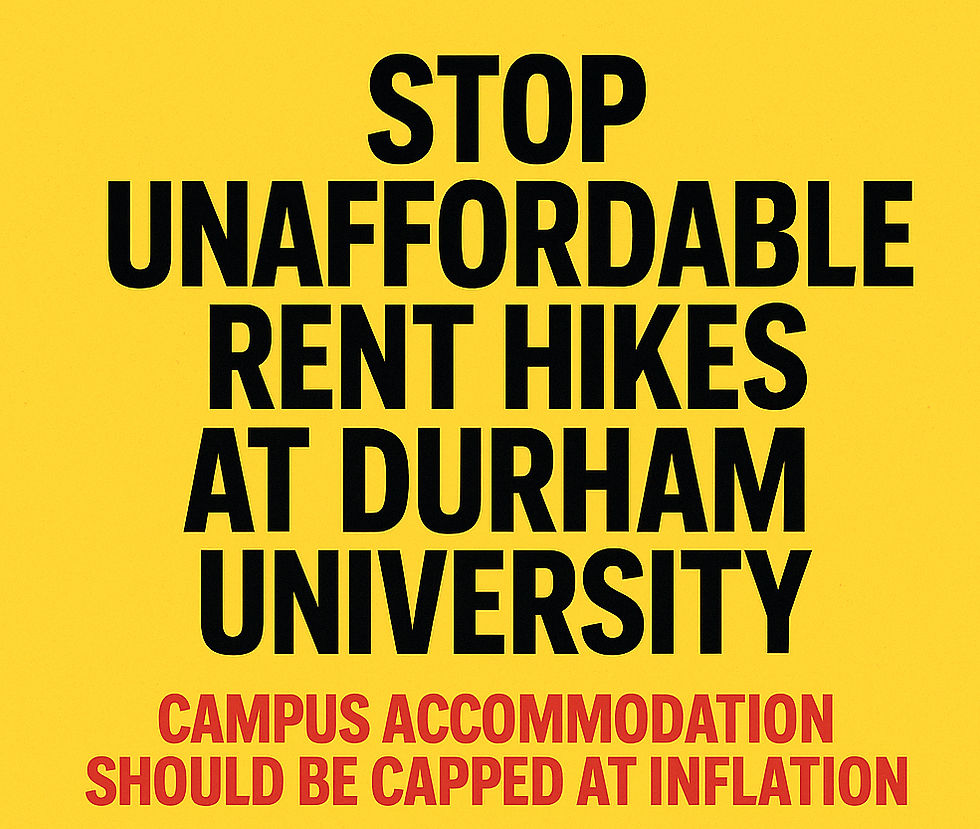Moral Ambition vs. Corporate Convention: Durham’s Hidden Career Bias
- Oliver Sherwood
- Nov 13, 2025
- 3 min read
Rutger Bregman, a Dutch philosopher known for works such as Utopia for Realists and Humankind, coined the term ‘moral ambition’ to describe a new kind of metric for success.
‘Not the ambition to get ahead of others, but the ambition to make the world better for others.’
Bregman puts forward an idea maybe all too familiar for Durham students. We currently operate within an education system that trains people to win within the system, not to change it. Bregman during his Oxford Union address challenged elite universities to produce ‘problem-solvers, not power-climbers'.
Durham University is bustling with bright, idealistic, and community-minded students, however the institutional culture within Durham indirectly forces the vast majority into morally neutral career paths: finance, consulting, and corporate law.
The university rightfully celebrates its position as one of the UK’s most employable institutions. Anyone with a vague interest in higher education would have seen the headlines this summer as Durham was crowned The Times and Sunday Times University of the Year 2026, and would naturally assume that a diverse range of careers are made known to students. However, hiding beneath the headline, a disproportional share of its institutional energy seems to direct Durham students towards careers in the corporate world. This article investigates how the university’s career culture, employer partnerships, and student expectations produce a narrow definition of success, often sidelining the arts, public services, research and creative industries.
Career culture
If you walk through the Careers Fair in October you’ll see the same logos dominating every year – J.P. Morgan, PwC, EY, Deloitte. Whether you call it subliminal messaging, institutional inertia, or genuine ignorance, it is clear that the finance sector dominates these events. A look at the resources on the Durham Careers & Enterprise sites confirms the pattern. Of the 49 events currently displayed on the website nearly 70% are orientated towards corporate or business-driven outcomes – consulting and finance roles, business driven start-ups and generic corporate career prep. Only 6% of all events target education, 4% target creative or cultural sectors and 10% the public sector. There is no reference to environmental advocacy, charities, social-impact work or NGOs.

Employer partnerships
Durham’s own Careers & Enterprise materials further reinforce this bias. When the Careers & Enterprise Centre (CEC) was launched the deputy Vice-Chancellor proudly highlighted long standing links with the same familiar names – KPMG, PwC, Goldman Sachs and Morgan Stanley. While the language of ‘diverse disciplines’ and ‘meaningful employer engagement’ is thrown around by the University, the excessive visibility of these high-paying sectors suggests that the institutional employer-network leans heavily towards the corporate end of the spectrum. Thus, it is no surprise that students perceive finance and consulting as the most accessible, commendable and respected career options.
This pattern, in real life and online, reflects a deeper institutional assumption, that student success is measured by employability within the market economy, rather than contribution to a public or moral good. Bregman calls for ‘moral ambition’, the courage to dedicate one’s skillset to solving problems the world needs solving, not climbing existing hierarchies. Yet, Durham’s career infrastructure seems designed to produce the exact opposite: employable graduates, with no moral ambition. A university that celebrates global citizenship seems to funnel its student towards corporate citizenship instead.
Student expectations
Durham’s institutional fixation on employability metrics has seeped and spread into student culture. Securing an internship or graduate scheme is often perceived as the ultimate mark of success, a tangible signal that one has navigated the university experience right. This perception, while understandable in a competitive market, narrows the diverse range of students ambitions. Employability is prioritised over exploration, career security over moral or intellectual curiosity.
Solutions
While countless events each week focus on how to secure a spring week at J.P. Morgan or an internship at PwC, we at DUSTT want to offer something different, Bregman’s moral ambition.
In the coming weeks, we’ll release a resource pack featuring opportunities for students who want to build careers that make a genuine positive impact: including internships, graduate schemes, conferences, and contacts across socially conscious sectors.
Looking ahead to next term, DUSTT is also planning an event that will bring together speakers for a Q&A panel on pursuing morally ambitious careers, sharing their experiences and advice on finding purpose beyond profit.
But don’t wait for that event to begin reflecting. Ask yourself now: How do you want to make a positive difference? Is it through environmental action? Strengthening communities? Closing the wealth gap? Supporting the vulnerable? Moral ambition starts with asking those questions and acting on the answers.


Comments